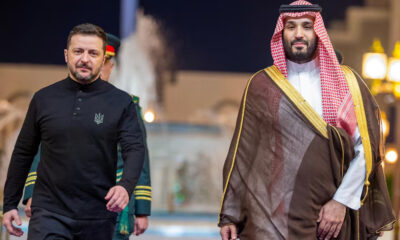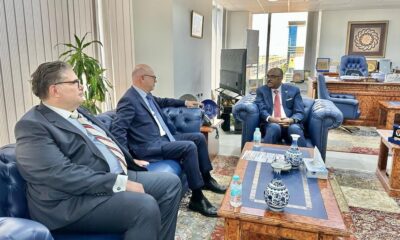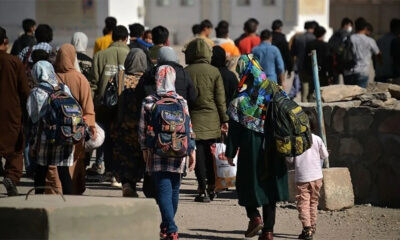Regional
Iran’s Guards ban communications devices after strike on Hezbollah
Lebanon and Hezbollah say Israel was behind the attacks. Israel has neither denied nor confirmed involvement, Reuters reported.

Iran’s elite Revolutionary Guards Corps (IRGC) has ordered all members to stop using any type of communication devices after thousands of pagers and walkie-talkies used by its Hezbollah allies in Lebanon blew up in deadly attacks last week, two senior Iranian security officials told Reuters.
One of the security officials said a large-scale operation is underway by the IRGC to inspect all devices, not just communication equipment. He said most of these devices were either homemade or imported from China and Russia.
Iran was concerned about infiltration by Israeli agents, including Iranians on Israel’s payroll and a thorough investigation of personnel has already begun, targeting mid and high-ranking members of the IRGC, added the official, who declined to be identified because of the sensitivity of the matter.
“This includes scrutiny of their bank accounts both in Iran and abroad, as well as their travel history and that of their families,” the security official said.
Iran’s Foreign, Defence and Interior Ministries were not immediately available to respond to the comments made by the security officials to Reuters.
In a coordinated attack, the pager devices detonated on Tuesday across Hezbollah’s strongholds. On Wednesday, hundreds of Hezbollah walkie-talkies exploded. The attacks killed 39 people and injured more than 3,000 people.
Lebanon and Hezbollah say Israel was behind the attacks. Israel has neither denied nor confirmed involvement, Reuters reported.
The security official declined to give details on how the IRGC force, comprising 190,000 personnel, are communicating. “For now, we are using end-to-end encryption in messaging systems,” he said.
According to the same official, there is widespread concern among Iran’s ruling establishment. IRGC officials have reached out to Hezbollah for technical assessments, and several examples of exploded devices have been sent to Tehran for examination by Iranian experts.
Another Iranian official said the Islamic Republic’s main concern was the protection of the country’s nuclear and missile facilities, particularly those underground, read the report.
“But since last year, security measures at those sites have increased significantly,” he said in reference to stepped up measures after what Iranian authorities said was Israel’s attempt to sabotage Iran’s missile program in 2023. Israel has never commented on this.
“There has never, ever been such tight security and extreme measures in place as there are now,” he added, suggesting that security has been significantly increased beyond previous levels after the pager explosions in Lebanon.
The IRGC is a powerful political, military and economic force in Iran with close ties to the Supreme Leader Ayatollah Ali Khamenei. Set up after the 1979 Islamic Revolution to protect the clerical ruling system, it has its own ground force, navy and air force that oversee Iran’s strategic weapons.
It exerts influence in the Middle East through its overseas operations arm, the Al Quds Force, by providing money, weapons, technology and training to allied groups: Hezbollah in Lebanon, Hamas in Gaza, Yemen’s Houthis and militias in Iraq.
Iran’s military uses a range of encrypted communication devices, including walkie-talkies, for secure communication, said the first Iranian source. While specific models and brands might vary, Iranian military communications equipment was often developed domestically or sourced from a combination of local and foreign suppliers, he said.
He said Iran’s armed forces have stopped using pagers for over two decades.
Tehran has developed its own military-grade radio transmissions through its defence industry to avoid reliance on foreign imports, especially due to Western sanctions imposed on Tehran over its nuclear program, he added.
However, in the past, Iran has imported communication devices from countries such as China and Russia and even Japan.
Iran and Israel have been locked in a shadow war for decades, with mutual allegations of sabotage and assassination plots, Reuters reported.
The conflict, including between Israel and Hezbollah, has intensified in the past year in parallel with the Gaza war, which erupted after the Palestinian Hamas group attacked southern Israeli communities on Oct. 7.
Iran and Hezbollah have blamed Israel for assassinating Hamas leader Ismail Haniyeh in Tehran and Hezbollah’s most senior military commander, Fuad Shukr, in Beirut a few hours earlier in July. Israel said it killed Shukr but it has not confirmed it was behind Haniyeh’s death.
Iran does not recognise Israel’s right to exist. Khamenei has previously called Israel a “cancerous tumour” that “will undoubtedly be uprooted and destroyed”.
Israel believes that Iran poses an existential threat. It also accuses Iran of secretly trying to develop nuclear weapons, though Iran denies seeking to build a nuclear bomb.
Regional
Iran will not negotiate under US ‘bullying’, Supreme Leader says
After Trump pulled out in 2018 and re-imposed sanctions, Iran breached and far surpassed those limits.

Supreme Leader Ayatollah Ali Khamenei said on Saturday that Iran will not be bullied into negotiations, a day after U.S. President Donald Trump said he had sent a letter to the country’s top authority urging Tehran to negotiate a nuclear deal.
In an interview with Fox Business, Trump said, “There are two ways Iran can be handled: militarily, or you make a deal” to prevent Tehran from acquiring nuclear weapons.
At a meeting with senior Iranian officials, Khamenei said Washington’s aim was to “impose their own expectations,” Iranian state media reported.
“The insistence of some bullying governments on negotiations is not to resolve issues. … Talks for them is a pathway to have new demands, it is not only about Iran’s nuclear issue. … Iran will definitely not accept their expectations,” Khamenei was quoted as saying, without directly mentioning Trump.
In response to Khamenei’s comments, White House National Security Council spokesman Brian Hughes reiterated almost word for word the choice of negotiations or military action that Trump said he had presented to Iran.
“We hope the Iran Regime puts its people and best interests ahead of terror,” Hughes said in a statement.
While expressing openness to a deal with Tehran, Trump has reinstated a “maximum pressure” campaign that was applied during his first term as president to isolate Iran from the global economy and drive its oil exports to zero.
During his 2017-2021 term, Trump withdrew the United States from a landmark deal between Iran and major powers that had placed strict limits on Tehran’s nuclear activities in exchange for sanctions relief.
After Trump pulled out in 2018 and re-imposed sanctions, Iran breached and far surpassed those limits.
U.N. nuclear watchdog chief Rafael Grossi has said that time is running out for diplomacy to impose new restrictions on Iran’s activities, as Tehran continues to accelerate its enrichment of uranium to near weapons-grade.
Tehran says its nuclear work is solely for peaceful purposes.
Khamenei, who has the last say on Iran’s key policies, said there was “no other way to stand against coercion and bullying”.
“They are bringing up new demands that certainly will not be accepted by Iran, like our defence capabilities, missile range and international influence,” he was quoted as saying.
Although Tehran says its ballistic missile programme is purely defensive, it is seen in the West as a destabilising factor in a volatile, conflict-ridden Middle East.
Tehran has in recent months announced new additions to its conventional weaponry, such as its first drone carrier and an underground naval base amid rising tensions with the U.S. and Israel.
Regional
France, Germany, Italy and UK back Arab plan for Gaza reconstruction
The plan, which was drawn up by Egypt and adopted by Arab leaders on Tuesday, has been rejected by Israel and by U.S. President Donald Trump, who has presented his own vision to turn the Gaza Strip into a “Middle East Riviera”.

The foreign ministers of France, Germany, Italy and Britain said on Saturday they supported an Arab-backed plan for the reconstruction of Gaza that would cost $53 billion and avoid displacing Palestinians from the enclave, Reuters reported.
“The plan shows a realistic path to the reconstruction of Gaza and promises – if implemented – swift and sustainable improvement of the catastrophic living conditions for the Palestinians living in Gaza,” the ministers said in a joint statement.
The plan, which was drawn up by Egypt and adopted by Arab leaders on Tuesday, has been rejected by Israel and by U.S. President Donald Trump, who has presented his own vision to turn the Gaza Strip into a “Middle East Riviera”.
The Egyptian proposal envisages the creation of an administrative committee of independent, professional Palestinian technocrats entrusted with the governance of Gaza after the end of the war in Gaza between Israel and the Palestinian militant group Hamas, read the report.
The committee would be responsible for the oversight of humanitarian aid and managing the Strip’s affairs for a temporary period under the supervision of the Palestinian Authority.
The statement issued by the four European countries on Saturday said they were “committed to working with the Arab initiative,” and they appreciated the “important signal” the Arab states had sent by developing it.
The statement said Hamas “must neither govern Gaza nor be a threat to Israel any more” and that the four countries “support the central role for the Palestinian Authority and the implementation of its reform agenda.”
Regional
Scores killed as Syrian forces seek to crush Alawite insurgency

Syrian security forces battled for a second day on Friday to crush a nascent insurgency by fighters from Bashar al-Assad’s Alawite sect, with scores reported killed as the Islamist-led government faced the biggest challenge yet to its authority.
The Syrian Observatory for Human Rights reported that more than 180 people had been killed in two days of violence in the coastal region of western Syria, which is heavily populated by members of the Alawite minority, according to Reuters.
They included at least two dozen male residents of the Alawite town of Al Mukhtareyah killed by gunmen on Friday, the Observatory and two Alawite activists said, citing contacts in the region and video footage from the scene.
In his first comments on the violence, interim President Ahmed al-Sharaa said government forces would pursue “remnants” of the ousted Bashar al Assad government and bring them to trial. He also said those who assault civilians would be held accountable.
“We will continue to pursue the remnants of the fallen regime .. . We will bring them to a fair court, and we will continue to restrict weapons to the state, and no loose weapons will remain in Syria,” Sharaa added in a pre-recorded speech.
Syrian authorities said the violence began when remnants loyal to Assad launched a deadly and well-planned attack on their forces on Thursday.
The violence has shaken Sharaa’s efforts to consolidate control as his administration struggles to get U.S. sanctions lifted and grapples with wider security challenges, notably in the southwest, where Israel has said it will prevent Damascus from deploying forces.
The oil-rich northeast of the country also remains outside state control, held by a U.S.-backed Kurdish-led group.
Syrians took to the streets on Friday to rally in support of the government in Damascus and other cities.
Saudi Arabia and Turkey, both allies of the government, also signalled their backing, while the U.N. envoy to Syria said he was alarmed by the clashes and killings, including of civilians.
Russia, which was a major backer of Assad but has sought to build ties with the new government, called on all leaders of the country to stop the bloodshed.
Iran, formerly Assad’s closest ally, said it “strongly opposes insecurity, violence, killing and harming innocent Syrians from every group and tribe.”
Images from Al Mukhtareyah showed at least 20 men lying in close proximity – some bloodied – by the side of a road in the town centre. Reuters was able to verify the location in the video, but not when it was filmed or by whom.
Alawite activists, speaking on condition of anonymity, blamed the killings on gunmen affiliated with the Islamist ruling authorities.
Syrian state news agency SANA, citing a security source, said “individual violations” had been perpetrated after unorganized crowds had headed to the coastal region following the attacks on government security personnel.
“We are working to stop these violations,” the source said.
A prominent Alawite cleric, Sheikh Shabaan Mansour, 86, was killed on Friday with his son in the village of Sahlab in western Syria, according to two Alawite sources. Residents there accused fighters aligned with Damascus of killing them.
CURFEWS
The violence spiralled on Thursday when the authorities said groups of Assad-aligned militias targeted security patrols and checkpoints in the Jableh area and surrounding countryside, before spreading.
Moussa al-Omar, a Syrian media figure close to the country’s new leadership, told Reuters that tens of thousands of fighters in Syria’s newly constituted security forces had been deployed to the coast in the operation and order had been largely restored as of Friday night.
He said the crackdown was “a message to anyone in the south or east of Syria that the state … is capable of a military resolution at any time even as it seeks peaceful solutions.”
Curfews were declared on Friday in the coastal cities of Tartous and Latakia, SANA said. Security forces mounted combing operations in both cities and nearby mountains.
Alawite activists say their community has been subjected to violence and attacks, particularly in rural Homs and Latakia, since Assad was overthrown in December after decades of repressive family rule and civil war.
While Sharaa has pledged to run Syria in an inclusive way, no meetings have been declared between him and senior Alawite figures, in contrast to members of other minority groups.
ESCALATION RISK
“The chaos and paroxysm of killings will undermine the confidence of both foreign states and Syrians in his government and its ability to steer Syria out of this difficult phase,” said Joshua Landis, head of the Center for Middle East Studies at the University of Oklahoma.
A group of Alawite clerics, the Alawite Islamic Council, blamed the violence on the government, saying fighters had been sent to the coast “with the pretext of (combating) ‘regime remnants,’ to terrorise and kill Syrians.” It called for the region to be put under U.N. protection.
Saudi Arabia condemned “crimes being undertaken by outlaw groups” in Syria and their targeting of security forces.
Turkey, a close ally of Syria’s new government, also stated its support for Damascus, saying, “The tension in and around Latakia, as well as the targeting of security forces, could undermine the efforts to lead Syria into the future in unity and solidarity.”
-

 Sport4 days ago
Sport4 days agoAfghanistan’s futsal team to face Greenland in Brazil tournament
-

 Sport4 days ago
Sport4 days agoAfghanistan beat Greenland 5-4 in Brazil futsal tournament
-
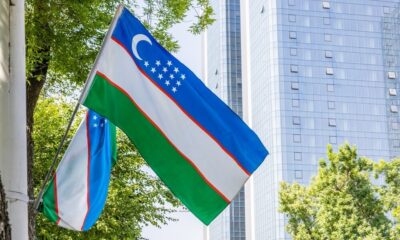
 Business5 days ago
Business5 days agoUzbekistan set to open permanent trade center in northern Afghanistan
-
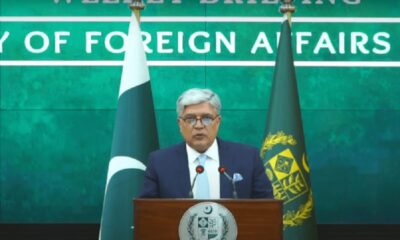
 Latest News4 days ago
Latest News4 days agoPakistan backs Trump’s push to recover military equipment left behind in Afghanistan
-

 World4 days ago
World4 days agoTrump says he will go to Saudi Arabia to reach $1 trillion deal
-

 Latest News4 days ago
Latest News4 days agoAfghanistan ranks ninth in 2025 Global Terrorism Index
-

 International Sports5 days ago
International Sports5 days agoFIFA announces massive $1 billion prize pool for Club World Cup
-

 Sport5 days ago
Sport5 days agoChampions Trophy: Williamson praised for propelling New Zealand to semi-final win


